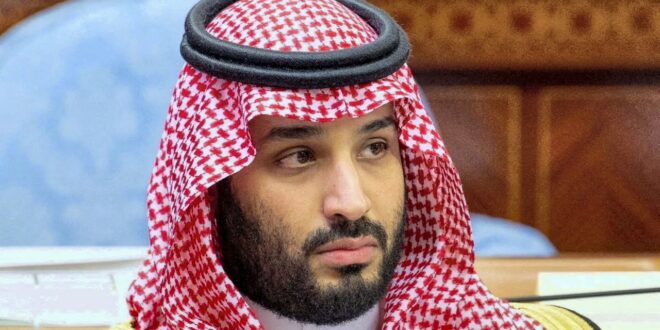An unprecedented meeting could happen as soon as this month, according to a report citing one of Mohammed bin Salman’s advisors as U.S. President Biden is slated to arrive in Israel
In a possible sign that Saudi Arabia may be willing to publicly acknowledge its warming under-the-table ties with Israel, a senior Saudi official has said that the Kingdom is mulling the possibility of inviting an Israeli representative to attend U.S. President Joe Biden’s upcoming visit to Jeddah.
Citing a person described as an unnamed advisor to Crown Prince Mohammed bin Salman, Israel news site Ynet reported on Thursday that the matter is currently under consideration by American, Saudi and Israeli officials, and that the visit could take place either during or following Biden’s visit.
Biden is slated to arrive in Israel on July 13 and will hold a meeting with his Israeli counterparts before travelling to the West Bank and then Saudi Arabia, where he will attend a Summit of the GCC+3, a group composed of the Gulf Cooperation Council, Egypt, Iraq, and Jordan.
Last month, Biden said that Israeli national security would be a major issue during his visit to Saudi Arabia, denying that the trip had to do with attempts to cap oil prices that have topped $5 a gallon in the United States.
“The commitments from the Saudis aren’t related to anything having to do with energy,” Biden said outside Air Force One. “It happens to be a larger meeting taking place in Saudi Arabia. That’s the reason I’m going. And it has to do with national security for them – for Israelis.”
The summit comes on the heels of bipartisan legislation aimed at bolstering defense cooperation between Israel and the Arab countries with the Pentagon’s involvement. The goal is to thwart threats from Iran and its proxies; U.S. defense officials have publicly encouraged such cooperation for months.
In a statement announcing Biden’s visit, White House Press Secretary Karine Jean-Pierre described the trip as focused on the issues of “Israel’s security, prosperity, and its increasing integration into the greater region.”
Several days after Biden’s statement, Prime Minister Yair Lapid extended an olive branch, stating that Israel seeks peace with Saudi Arabia “as with any country in the region.”
“I won’t say whether we have under-the-radar talks with the Saudis,” he said. “We have a joint interest in the subject of Iran, that it won’t become a nuclear threshold state.”
He added, “Every country that is under the same threat must find ways to think together on how to cope with that threat. I’m not certain that the enemy of my enemy is always my friend, but I can always think that I can consider working together with them against a common enemy.”
Lapid also addressed Biden’s visit to Israel, saying that Jerusalem does not expect the Americans to facilitate a peace deal with Riyadh, but rather that “we expect this from ourselves.”
“Israel extends its hand always to anyone in order to achieve lasting peace,” Lapid said.
Riyadh was supportive of Israel’s 2020 rapprochement with the United Arab Emirates and Bahrain. But Saudi Arabia has stopped short of itself normalizing ties with its Israeli neighbor.
Israeli officials see the possible meeting in Riyadh as a chance to negotiate smaller concessions, such as flyover rights, Ynet reported.
The Wall Street Journal recently reported that this March Israel took part in a secret, U.S.-initiated meeting of top military officials from throughout the Middle East in Egypt in order to discuss combatting the shared threat of Iran’s missile and drone capabilities.
The talks, held at Sharm El Sheikh, included senior military officers from Israel, Egypt, Jordan and two countries with whom Israel does not have relations: Saudi Arabia and Qatar.
The United Arab Emirates and Bahrain sent officers to the meeting as well, the report said, and Gen. Frank McKenzie, the head of the U.S. Central Command, represented the United States, which convened the gathering.
According to the report, this meeting was the first time that such a range of senior Arab and Israeli officers were gathered by the United States to talk about a shared threat.
The recent attacks by Iran and its proxies against Saudi infrastructure and other targets in the Middle East have prompted the coalition of Israel and a number of Arab countries in the region to develop a joint mechanism for detecting and intercepting missiles and drones.
There has already been security coordination on this matter between the Israeli defense establishment and its peers in some of these countries. This cooperation includes operational coordination, the exchange of relevant intelligence about threats, visits by delegations and joint training between Israeli and foreign air forces.
Defense Minister Benny Gantz told lawmakers last week that what he dubbed the “Middle East Air Defense Alliance” is already operational. “Over the past year I have been leading an extensive program, together with my partners at the Pentagon and in the U.S. administration, that will strengthen the cooperation between Israel and countries in the region,” he said, according to an official transcript. “This program is already operative and has already enabled the successful interception of Iranian attempts to attack Israel and other countries.”
 Eurasia Press & News
Eurasia Press & News




